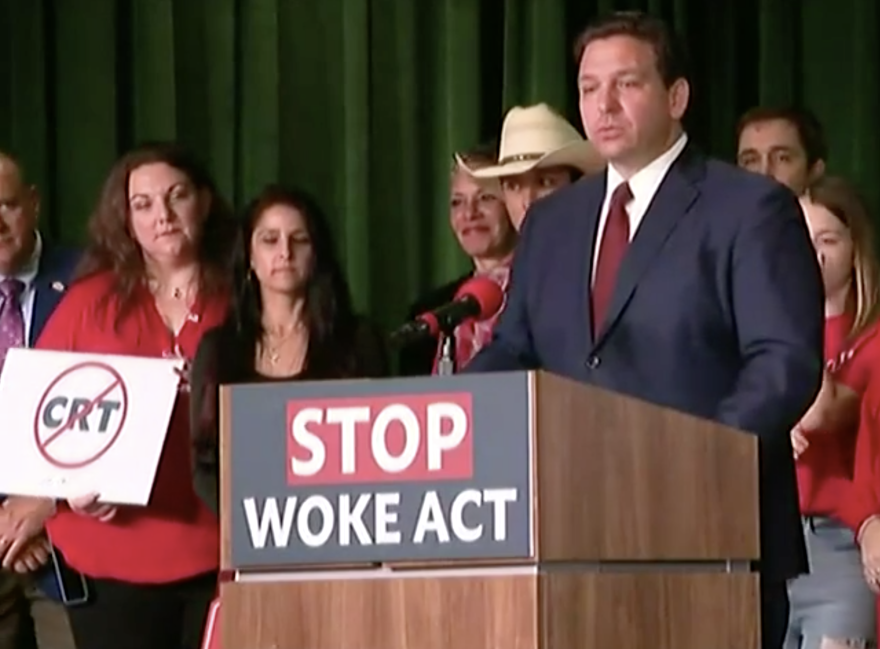NEWS ANALYSIS: Florida’s Stop WOKE Act designed to limit academic discussion on race in public schools’ classrooms
The Florida Senate passed the “Stop WOKE Act” on March 10, and the bill is now headed to the desk of Governor Ron DeSantis for approval. The bill would place restrictions on the discussion of race in classrooms. DeSantis and the legislation have faced criticism for inflaming the ongoing debate over critical race theory as well as for attempting to censor the historical perspective of minorities, particularly African-Americans, in the United States.
This bill comes months after the Florida Board of Education passed a legislation to ban critical race theory from public schools. Critical race theory, or CRT, is the study of U.S. history through a racial lens, acknowledging that racism is ingrained in U.S. institutions and has played a key role in shaping American society. It found its way into politics in 2020, when the murder of George Floyd reignited the Black Lives Matter movement and opened a national discussion about the systemic racism of the U.S. police system.
Conservatives have sparked a debate about the presence of CRT in school curricula. According to Reuters, parents have complained that “CRT is being used to promote an anti-white, anti-American worldview through racial sensitivity training and allegedly biased curricula that indoctrinate impressionable children.”
The term “indoctrinate” has been a common term used by conservatives to antagonize those who feel that the ugly parts of American history should be sugar-coated or overlooked in the classroom. However, the purpose of CRT is essentially to reverse the indoctrination that occurs from a primarily white account of history. It brings light to other perspectives, those perspectives being that of minorities, making it appear to proponents of CRT that some of their adversaries are not properly informed of the concept they speak out against.
CRT is typically taught in the curricula of colleges, universities, and other institutions for higher education, but the Florida ban of CRT included public elementary, middle, and high schools. These schools do not have CRT courses, but the concepts can still be applied in class discussions. This could be a history teacher recognizing the brutal treatment of indigenous peoples by Christopher Columbus or shedding light on police brutality and lynching practices during the civil rights era.
“Opponents of critical race theory say school children should not be taught that America is fundamentally racist,” states the Associated Press. In other words, they do not support the recognition of America’s controversial history of white supremacy and tense race relations. The 2021 legislation categorized CRT with “theories that distort historical events,’, deviating from what have been considered the “fundamentals of history.”
However, proponents of CRT think that these notions promote ignorance by white Americans of the oppression that white people have imposed on African-Americans and other minority groups throughout history. In a discussion of CRT on The Daily podcast, host Michael Barbaro asserts, “They [opponents of CRT] seem to be saying it’s asking us to do something, and that something is to give up certain visions of the United States and of themselves that they have been taught for a really long time.”
Recently, Florida conservatives have continued to place restrictions on the discussion of race in classrooms with the creation of the “Stop the Wrongs to Our Kids and Employees Act,” more commonly referred to as the “Stop WOKE Act.” The legislation restricts honest conversations about race and racism in classrooms and workplaces, and it gives parents and employees the right to sue public schools or employers that encourage discussions or training about race.
The bill was sponsored by Senator Manny Diaz, R-Miami, who emphasized the legislation’s goal of preventing the promotion of “personal agendas” in the classroom, saying, “As a teacher, you should never know my politics,” as reported by the Tallahassee Democrat.
Some note that teachers already are not allowed to share their political views, as the discussion of politics in most educational workplaces is frowned upon, if not prohibited. Not to mention, CRT in its academic context is a historical concept, not a political one. Nevertheless, the bill still illegalized these discussions, stating that lessons “may not be used to indoctrinate or persuade students to a particular point of view” (Section 2, subsection 3, line 307-310).
DeSantis faced criticism from opponents of the bill, especially when he invoked the words of civil rights leader Dr. Martin Luther King Jr. when advocating for the bill. The Washington Post reports that DeSantis said, “He [King] said he didn’t want people judged on the color of their skin, but on the content of their character.” Critics of DeSantis believe that his use of King’s words was ignorant for attempting to eliminate the conversation of race from American society, which was the opposite of what King did during the civil rights movement of the 1960s.
The bill states that an individual “does not bear responsibility for actions committed in the past by other members of the same race or sex.” It continues to say “An individual should not be made to feel discomfort, guilt, anguish, or any other form of psychological distress on account of his or her race” (section 2, subsection 3e-f, lines 294-299).
Many use the term “white guilt” to describe the psychological distress that this portion of the bill attempts to prevent. White Americans in support of the bill are against discussions of race in the classroom because they fear that their child will be treated as though they are to blame for the actions of all white people in history. However, critics of the bill saw this as a way for white people to ignore racial issues of the past even when they are still occuring today.
“‘At no point did anyone say white people should be held responsible for what happened,’” expressed state Senator Shevrin Jones in USA Today, “‘but what I would ask my white counterpart is, are you an enabler of what happened or are you going to say we must talk about history?’”
Governor DeSantis did not shy away from publicizing his support for the “Stop WOKE Act,” which is not surprising given his endorsement of the 2021 CRT ban. People on both sides of the CRT and “Stop WOKE” debate expect that DeSantis will sign the bill when it arrives at his desk. If signed, the legislation would go into effect starting July 1, 2022.














